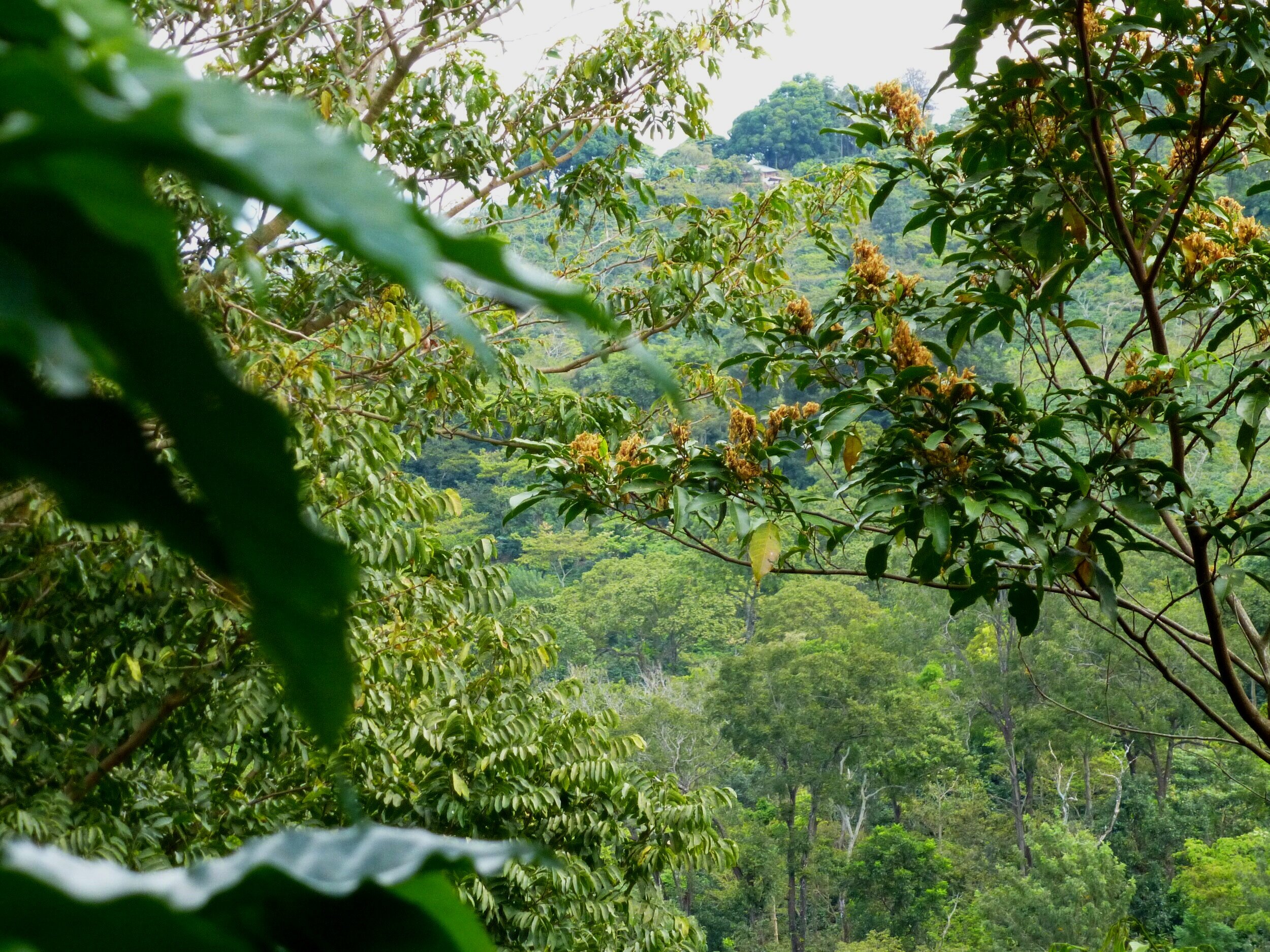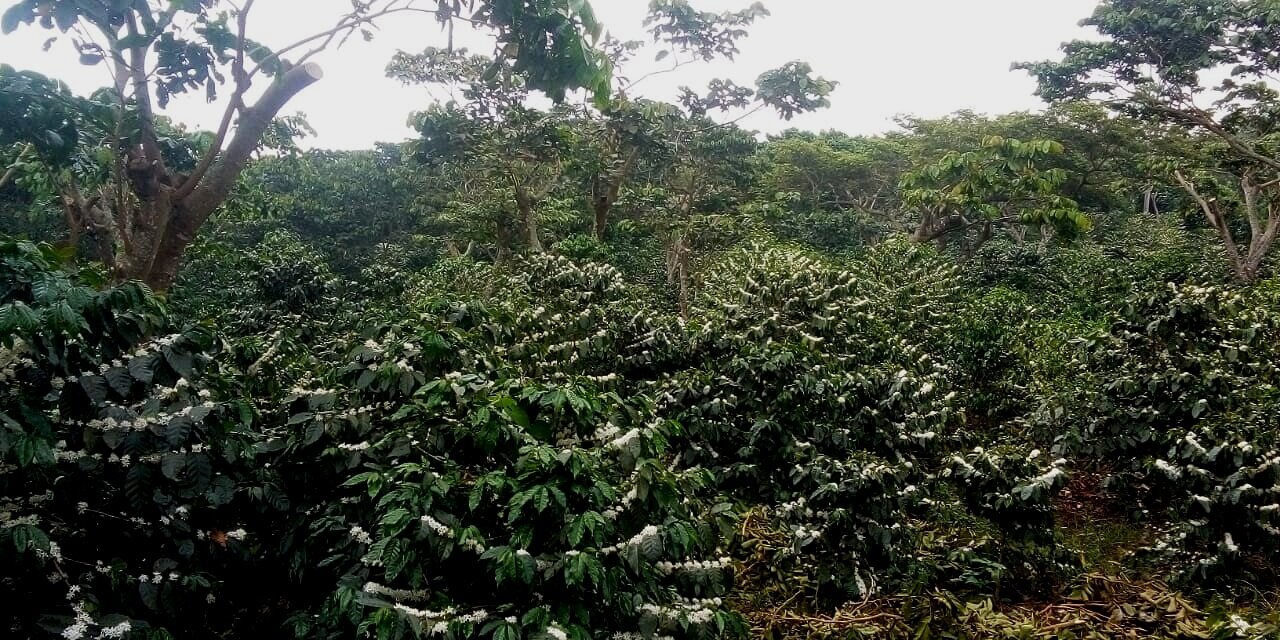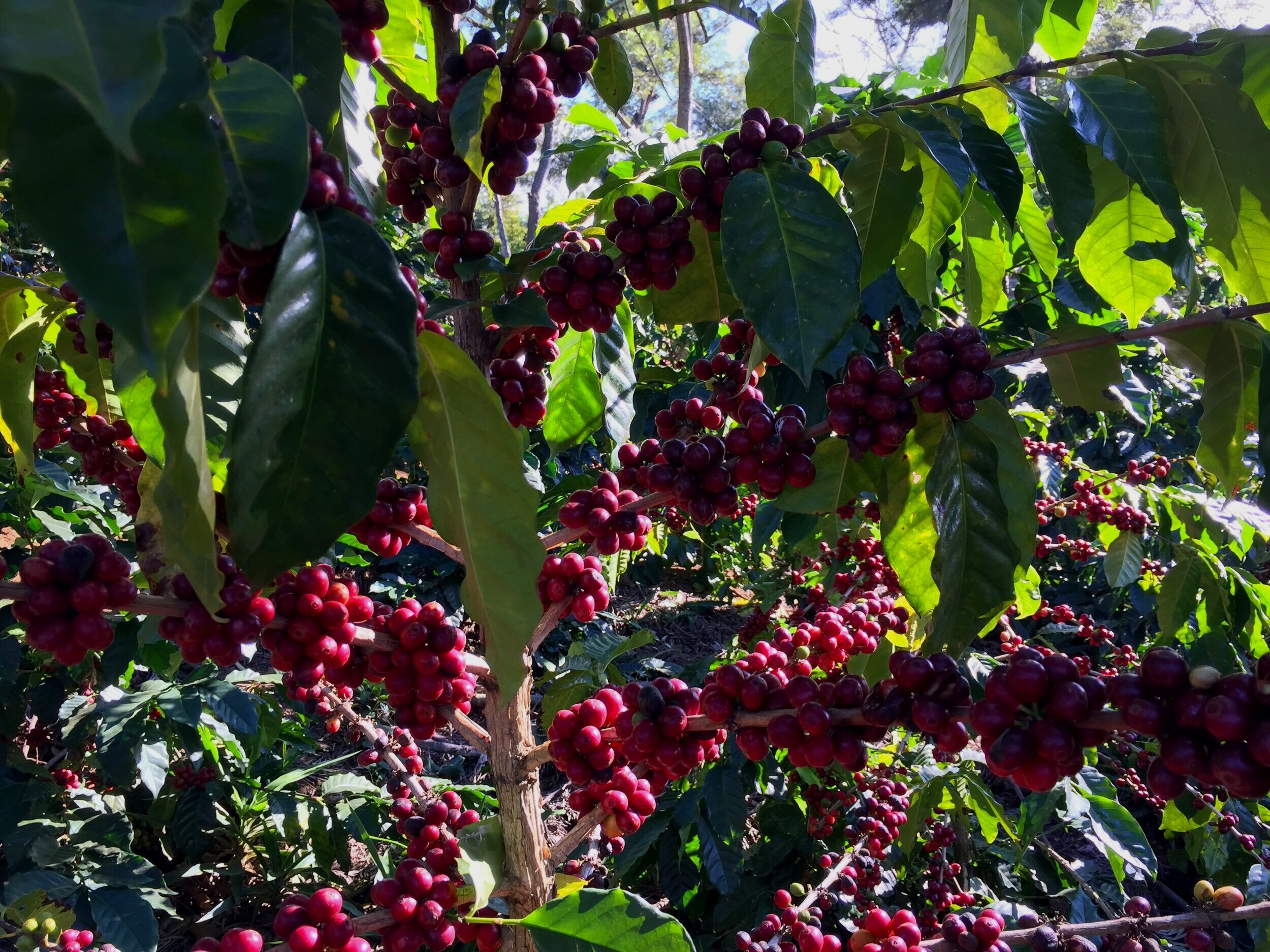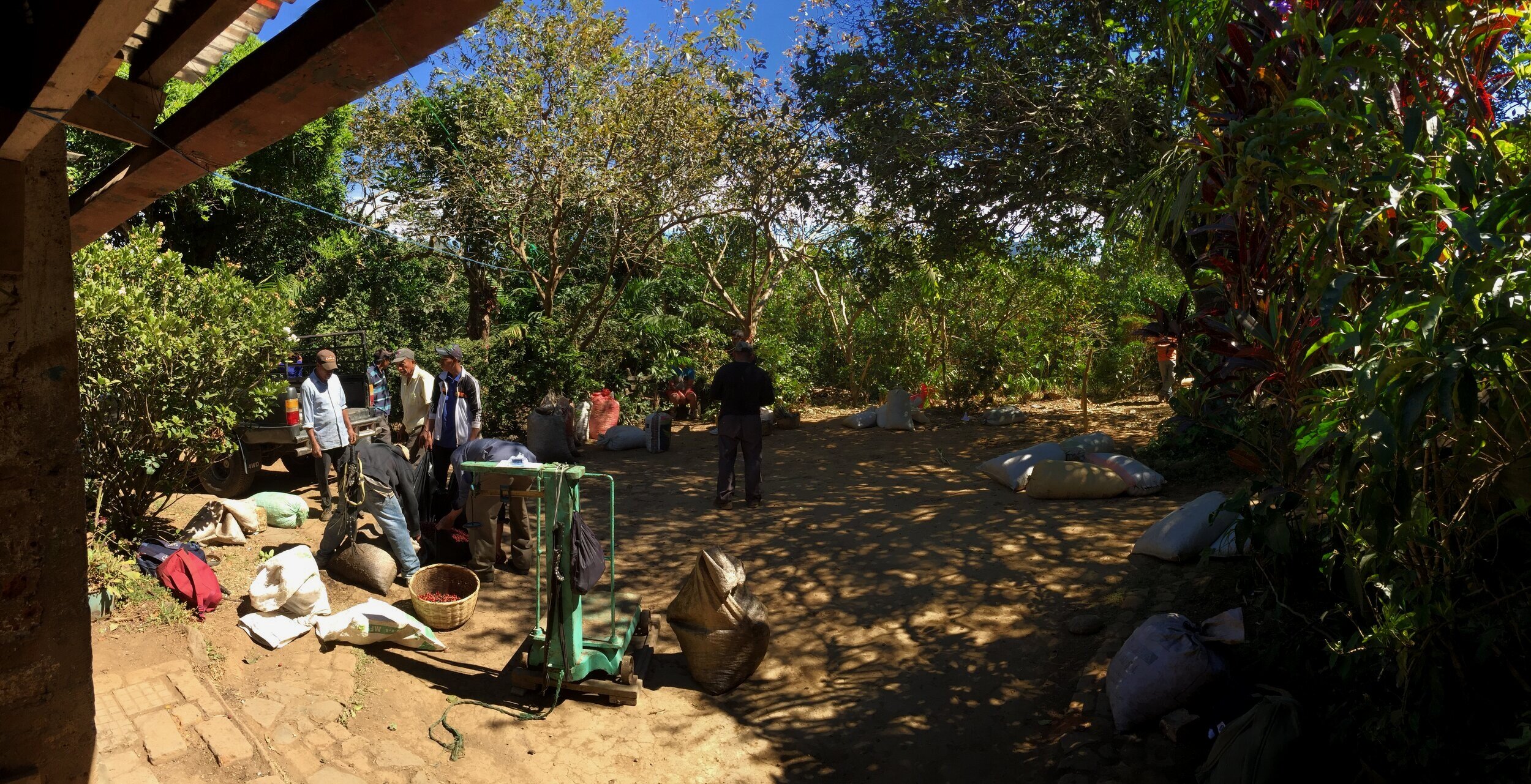About Finca Villa Mercedes
When you are born into a coffee producing family, whether you realize it or not, coffee will always be part of your destiny.
Coffee production has not only fueled the Salvadoran economy but it has also shaped much of its history and the lives of many families throughout generations. Even when you think you have chosen a different path, even when you leave your country behind and move to a different continent, speak a different language, have different dreams, coffee will inevitably and inescapably continue to be a part of you and it will eventually draw you back until you embrace it with the same passion your ancestors did.
Just like a novel of magic realism, it is history repeating itself; your grandfather’s voice and laughter, your childhood memories coming alive with the pungent smell of coffee pulp, reminiscing about the long walks on the coffee mountains with eight dogs and seven cousins with the inevitable tumbles on the slippery roads. The skinny stray dogs crossing your path, the men with their machetes ready for work, the women carrying water and heavy loads of wood on their heads with little children walking behind them trying to keep up to their pace. The mixed emotions of life around a coffee plantation so painfully and beautifully different.
It is only a matter of time until you surrender to the fact that it is now your turn to take care of that land, to protect it, and to accept the responsibility of having a small community’s livelihood depending on your decisions and your willingness and determination to keep on going. The respect and admiration for the people whose lives depend on the coffee cycle and harvest, the sense of wonder from observing such generous and resilient plants compel you to accept your heritage, embrace your roots and take a leap of faith to continue the family tradition of producing coffee. Coffee, that wonderful plant whose fruits and seeds touch so many lives from a remote Macondo-looking village to bustling cafes in trendy cosmopolitan cities across the globe.
When my great-great-grandfather, Marcial Morán, a landowner and coffee grower from Ahuachapán, El Salvador, and his wife, Mercedes, passed away, they left everything they had to Rafael, Marcial’s only son who was born out of wedlock to Tránsito Herrera, a woman who lived in the nearby town of Concepción de Ataco, known simply as “Ataco”.
Mercedes, Marcial’s wife, was unable to have children so she raised, loved and educated Rafael as her own. He became a lawyer and the mayor of Ataco and continued growing coffee for his entire life, even after he had become quite “extravagant” due to a head injury he had sustained when he fell off his horse. He died in 1940 and for many years after his death, the people of Ataco swear that he could still be seen at night galloping on his white horse through the plantations. Yes, I know. Magic Realism.
Rafael’s oldest son, René Herrera Morán was my beloved grandfather. A thin, tall, charismatic man with a contagious laughter and an ability to enjoy life and make friends. He lived in Ataco for most part of the year but after the harvest he would come back to San Salvador, El Salvador’s capital, and travel throughout Latin America as an Ambassador for Coffee. He was a member of El Salvador’s Coffee Association (Asociación Cafetalera) and represented El Salvador at many international conferences and he too, like his father, served as mayor of Ataco.
His love for coffee and especially for his Red Bourbon plants was immense. His pride for his land, his love for his crops, his respect for the community and his concern for the future of coffee were his daily bread.
In 1980, at the beginning of the civil war, my mother and I moved to Mexico. The war and violence were ravaging El Salvador and my mother, Ana Eloisa Herrera Schlesinger, a young beautiful and feisty lawyer (and the eldest of 3 daughters), had seen already friends and relatives “disappear” and decided to move away. She returned to El Salvador only occasionally but when my grandfather passed away, almost at the end of the civil war, she put her career aside to take charge of the coffee plantations.
I lived and enjoyed Mexico City for 4 years and after graduating from high school there, I came to Italy on vacation where an Italian with the typical “Ciao bella!” catch phrase convinced me to consider staying here for good.
Italy is where I got married, Italy is where I had my 2 sons, Italy is where I got divorced, Italy is where I started working as a Film Production Coordinator in the movie business back in 1989 on The Godfather III. Yes, the Godfather III, not I nor II – I am old but not that old!
After Coppola’s film came many more movies. A fast-paced whirlwind around the world kept me busy for many years. My childhood memories were pushed at the bottom of my mind and soul and the coffee crisis and the war on coffee rust were only distant family conversations.
My mother passed away abruptly at 57 years old. I was 35 and my world came momentarily to a stop. How could I take care of my land and coffee if I was living in Europe working and raising two boys on my own? I couldn’t. My two aunts stepped up and took care of the coffee. I gladly and thankfully granted them all the decision making so I could continue “saving the world” – in the “glamorous” movie business.
On a summer vacation in El Salvador, after my sons had grown up and had moved abroad following their own path, I was walking through the coffee plantations and I saw that there were fewer and fewer Bourbon plants. They had been replaced by many healthy looking, high yielding Catimores. My grandfather’s beloved Bourbons were practically gone. The essence of my grandfather’s plantations had been drastically transformed.
Back in the farm, chatting with my aunts over a (rubber tasting!) coffee from our new Catimores, I asked why there had been such a drastic change of varietals. They explained that coffee rust was too strong and too expensive to control so they had decided to turn to the stronger, more resistant and highly productive Catimor. Coffee prices were so low, they said, that it was impossible to invest in Bourbon or any other high-quality coffee. Too expensive to take care of them and too risky.
At that moment, I made a promise that I would bring back the quality to my farms. I would drink again the sweet, well balanced buttery chocolate coffee that was part of my childhood memories.
Now that my sons were independent, I had no more excuses as to why I could not step up and take charge of my coffee plantations.
More than 5 years have gone by since I made the decision to take charge of my coffee. Many coffee fairs, many coffee courses and a lot of studying later, I’ve been slowly transforming some of my plantations back to Red Bourbon. This Salvadoran classic – much like a white shirt – never goes out of style. That lush, quintessential Salvadoran cup of coffee would once more be the flagship of my coffee plantations.
It was only logical to begin this journey back to quality coffee with Villa Mercedes, a small but significant coffee plantation which was named in honor of my great-great-grandfather’s wife, Mercedes, the woman who so selflessly gave all her love and belongings to her husband’s natural son. It was only logical to begin the transformation where our family heritage began. The same way it was only logical to begin my journey back to Specialty Coffee honoring my grandfather’s legacy by continuing to produce his favorite coffee.
Villa Mercedes is now a lush 2.5 manzanas plantation, 1,300 masl, completely planted with Red Bourbon. Its fertile soil and, its shade-grown coffee, its abundant flora and fauna had been so patiently waiting to be treated with the dignity it deserved.
I am slowly learning and slowly transforming my land back to the best quality coffee there is. Starting with Villa Mercedes, a Red Bourbon oasis, I am now beginning to plant Kenya in Santa Luciita and plan on transforming at least 10 of the 38 manzanas into specialty coffee.
Due to the coffee price crisis, many producers have abandoned their land as coffee is no longer profitable. Many plantations have been seized by the banks as the owners aren’t able to pay back their loans or they have sold their land for ridiculous low prices to speculators eager to construct private residences, hotels or restaurants. The area, due to its fresh climate and green mountains, has become a major tourist attraction so it is increasingly profitable to turn coffee plantations into tourist attractions. Rents in downtown Ataco are at an all-time high forcing people to move out.
My coffee plantations sit near one of El Salvador’s major water reservoirs and it is in great danger. Water shortage is increasing due to the diminishing forests and the ever-growing constructions. Climate change and warmer temperatures, partly due to the area’s deforestation, are endangering local fauna and flora – including coffee.
We tend to be disconnected from the origins and the realities of our food and beverages. We must understand that traceability is fundamental. We must understand that it is no longer a choice but an obligation to buy conscientiously, responsibly, and sustainably as it is the only weapon we, as consumers, have to make a positive impact in the world. As a coffee producer I can only make the commitment of growing my coffee in a way that will help the local environment flourish and the local economy thrive while striving to offer the highest quality possible.
I can only hope that one day, the family’s new generations will also be drawn back to their roots and will feel the urge to take care of their land bringing in whatever they have learned and whatever they have become in distant lands.




Farm Specs
SIZE: 2.5 manzanas (approx. 6.177 acres)
ALTITUDE: 1300 masl
VARIETAL: Red Bourbon
PROCESS: Washed
FLAVOR PROFILES: Caramel and Chocolate
LOCATION: Concepción de Ataco, Ahuachapán
COOPERATIVE: N/A
Contact Information:
Email:
LinkedIn:


